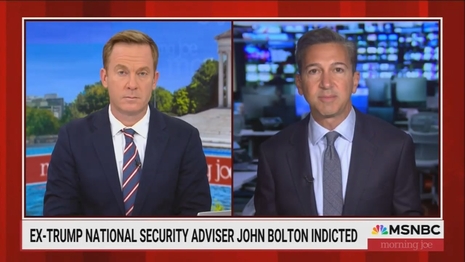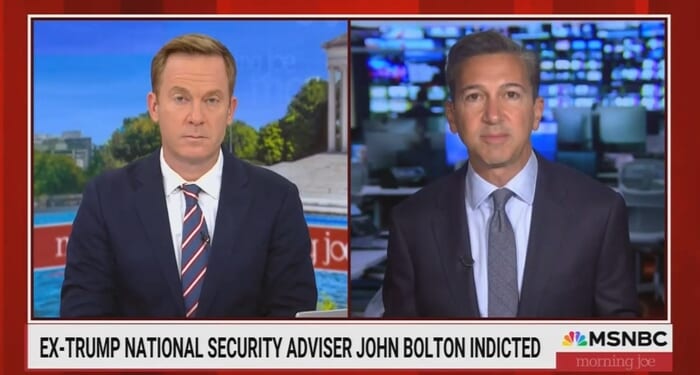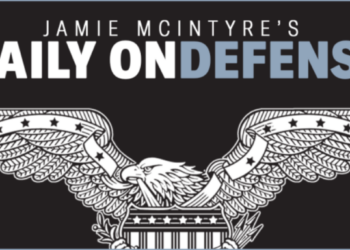 Despite the fact that the federal investigation into former national security advisor John Bolton’s alleged mishandling of classified information was started during the Biden administration, MSNBC’s Morning Joe suggested on Friday that the DOJ under President Trump following through was yet another case of targeted political prosecution.
Despite the fact that the federal investigation into former national security advisor John Bolton’s alleged mishandling of classified information was started during the Biden administration, MSNBC’s Morning Joe suggested on Friday that the DOJ under President Trump following through was yet another case of targeted political prosecution.
This came a day after Bolton was indicted on 18 counts for knowingly misusing national defense information.
Justice and intelligence correspondent Ken Dilanian relayed Bolton is unlikely to be innocent: “And the indictment says that Bolton used language that made clear he knew he was talking about sensitive information. Things like, ‘The intel briefer said,’ or ‘when in the Situation Room, I learned.’”
But Dilanian questioned the rationale behind Trump’s DOJ picking the case up after Team Biden dropped it. Somehow, it wasn’t political for the Bidenites to leave Bolton alone to attack Trump through an election season, but now it’s political to indict under Trump. Dilanian claimed Team Biden was trying to keep Iran from knowing that it had penetrated their intelligence:
Co-host Jonathan Lemire picked up on Dilanian’s question with another angle, suggesting there were a lot more deserving targets out there who were passively pardoned:
Ah, yes. That classic issue of carelessly handling sensitive knowledge to the point of enemies stealing it. This was like CNN claiming a lot of people might commit mortgage fraud. But they don’t.
MSNBC wanted it both ways: they couldn’t ignore the legitimacy of the case, but insisted upon villainizing Trump to please its audience in the process.
Washington Post columnist David Ignatius made an odd self-contradiction when contrasting the case with those against James Comey and Letitia James:
Financial Times editor Edward Luce pointed to the issue of classification as another way for Trump target enemies: “I think it’s fair to say […] there’s an over-classification problem in Washington. And that everything if everything is classified […] then nothing is classified. And therefore it gives a vengeful actor, like President Trump, enormous scope to just pick and choose who to take revenge on.”
Luce could have used this argument to underline “vengeful actors” had “enormous scope” to go after Trump on the same issue.
As Dilanian reported, Bolton was not ignorant or foolhardy about the nature of the information of which he had access. And the fact that Iran was able to steal information he improperly handled showed it wasn’t a simple and forgivable mistake.
The transcript is below. Click “expand” read:
MSNBC’s Morning Joe
October 17, 2025
6:04:16 a.m. EST
(…)
JONATHAN LEMIRE: So, Ken, people I’ve talked to say, look, this is still a broad pattern of retribution. There is still a real — there is still great concern how the President is breaking — shattering norms and directing his DOJ, either specifically or just by, you know, naming villains, if you will. Naming foes and others kind of get the hint to who they go after. But the John Bolton case was described to me is a little different than Comey and James. There’s a little more of a there, there. Walk us through what you know about this particular matter.
KEN DILANIAN: Good morning, Jonathan. Good morning, guys. You’re absolutely right. I think it’s a lot different, actually, this is what my sources are telling me, than those other cases which appear to be largely without merit.
This one, though, arose in the Biden administration. And this is a very serious and detailed indictment. It says that John Bolton derived secrets from his time as national security adviser, assembled them because he was writing a book, sent them over unclassified email and messaging apps to his wife and daughter. We’ve identified the two people as his wife and daughter. And then that information was hacked by the government of Iran. At least one of those email accounts was hacked. And so the government of Iran obtained some of these state secrets according to this indictment.
And the indictment says that Bolton used language that made clear he knew he was talking about sensitive information. Things like, “The intel briefer said,” or “when in the Situation Room, I learned.”
So this is, this — and these charges, as you said, carry ten years each so he could spend the rest of his life in prison, in theory, if convicted on these charges. But let me tell you what the defense could be here.
I should add that — and this case has been — this case is being prosecuted by career prosecutors, respected people, unlike the Comey and the James case, which was avoided by every career prosecutor in the Department and pursued only by Donald Trump’s political appointee. This one has gone through normal channels as we understand it.
But let me explain some potential mitigating circumstances here. Lots of people who have jobs where they see classified information write books. And they send that — the manuscript through a publication review, for example, if you’re a CIA officer. And oftentimes those reviewers will say, “Sorry, you can’t say that. It was classified. We’re keeping that out of the book.” Well, that information was classified. It went over an unclassified email system. Those people don’t get prosecuted for doing that.
So what’s at issue here are not documents marked classified, which was the case in the Donald Trump indictment. These were — this was information that John Bolton gathered and wrote down in diaries and sent that the FBI and the CIA and other people have determined contained national defense information. And when you look at the descriptions in the indictment, it’s pretty clear that some of it probably did.
But the question here is, where is the line for people who are writing books if — John Bolton did go through the publication review process here. Now, there’s allegations that he ignored some of the suggestions from people about what to leave out of the book. But there’s a lawyer named Mark Zaid who represents a lot of people who write books, and what he was saying last night is that if you’re going to prosecute John Bolton, you got to prosecute a lot of other people who wrote books and had potentially classified information on their email systems, which was then left out of the books, but which was actually sensitive.
And the other thing is Abbe Lowell, John Bolton’s lawyer, is saying here that this was not classified. These were — this was information that he kept for diaries. And he said that the FBI has known about this for a long time. And that’s true. This arose in the Biden administration. And what — but what seems to be the case is that they did not know the extent of what was in at least one of his email accounts until they discovered that Iran — they discovered the material that Iran had hacked through a U.S. intelligence penetration of Iran. That’s according to my reporting.
And that’s one of the reasons this case didn’t go forward in the Biden administration, because officials were concerned about revealing that penetration. The Trump administration has made a different calculation. They’re okay with revealing it. They’ve revealed it now to the Iranians. So whatever penetration they had is now shut down. That’s how badly they wanted to prosecute John Bolton. And that’s where you can ask questions about whether this case should have gone forward, guys.
LEMIRE: Really important reporting there. MSNBC justice and intelligence correspondent Ken Dilanian. Ken, thank you as always.
And Mika, the Ken makes the great point here. There is, you know, we see this is — there are differences between Comey and James cases and this one. These are career prosecutors. This is an investigation that’s been going on for a long time. There does seem to be, at least per the indictment, some evidence of wrongdoing. But it’s about selective prosecution. It’s the idea, like, this is something that a lot of people in Washington who have high level jobs, access to classified information have to deal with. But yet it’s just Bolton, a Trump critic, who’s the one facing, potentially now, criminal charges.
(…)
6:10:28 a.m. EST
KATTY KAY: Yeah. I mean, I think as judicial watchers, David Ignatius, you know, trying to make out — figure out what — how important these indictments are, you could look at it from a purely partisan point of view and say, “If you are a critic of the President, then you’re going to be indicted.” And if you’re a Republican, you’re going to look at this and say, “Well, the Democrats used lawfare as well against President Trump.” And the two sides seem just very set in their positions on this one. It’s remarkable to me how everyone — I talked to Republicans and they say, “Well, you guys did this before, so we’re just doing what you did.” Is it worth looking at the, kind of, individual indictments, or should we be looking at the bigger picture here?
DAVID IGNATIUS: I think this is a case that shows us that you do need to look at the details. Two things can be true at once. This is part of Trump’s pattern of revenge against enemies. In that way, it’s like the cases against James Comey and Letitia James that were brought. But it’s different in the sense that, as Ken Dilanian was saying in his reporting the fact pattern is different. Those other cases really are so thin, lawyers almost laugh at them.
That’s not the case here. There are tough questions of law. This is a process that many people who serve in government and then want go on to write memoirs use. They take their diaries, and their diaries have all kinds of sensitive things in them, and they use those diaries to write the books. So, I think this is this is a serious case.
The one thing that I think is indisputable is that John Bolton is a target now in an investigation that was considered by the Biden administration and then dropped, because Donald Trump sees him as an enemy. He’s on the enemies list —
KAY: Which is the point that Wall Street Journal is making.
IGNATIUS: — and now we move into this prosecution. So, it’s different from the Comey and James cases on one level. But on another level, it’s not different at all. These are enemies.
EUGENE ROBINSON: That’s exactly right. There is a pattern. You cannot ignore the pattern that if you crossed Donald Trump in some very public way, then you’re vulnerable, he considers you vulnerable. I point out a couple of things. Number one, John Bolton has never been confused with a Democrat, right? I mean, no one would call him a Democrat. He’s not. He never has been.
And number two, there’s this question of diaries. I mean, it is it is true, as Bolton’s lawyer said, that all these high ranking officials, or many of them at least, do keep diaries to sort of record what they did. And yes, they do it with an eye toward writing books eventually, maybe just with an eye toward history that can be revealed some day. So, that’s the part of the indictment I don’t get. I mean, look, you just did a biography of —
KAY: Of somebody who kept diaries.
ROBINSON: — one of the greatest American public servants. Were their diaries? You know, did some Zbigniew Brzezinski have diaries? And should he have been prosecuted for them?
EDWARD LUCE: He — well he, like Bolton, kept diaries, wrote a memoir, and got that memoir cleared. Bolton’s memoir was cleared from —
ROBINSON: Was cleared.
LUCE: Yeah.
ROBINSON: Exactly.
LUCE: So, I mean, that’s why it was published. Otherwise it wouldn’t. It would have been pulped and then republished with the missing bits. But that didn’t happen.
I mean, I went to see John Bolton in his downtown D.C. offices a few days ago to talk about, you know, prospects. And he showed me the, sort of, the room of filing cabinets where he keeps all his documents. And he described how the FBI had been, sort of, going through them with a toothpick.
I think it’s fair to say, as the late, great American Senator — Democratic Senator Daniel Patrick Moynihan said, that there’s an over-classification problem in Washington. And that everything if everything is classified, including like breakfast menus and stuff, then nothing is classified. And therefore it gives a vengeful actor, like President Trump, enormous scope to just pick and choose who to take revenge on.
















